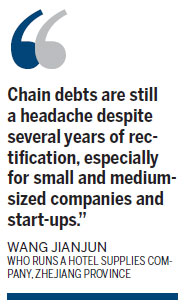Credibility still top concern for Chinese firms
Updated: 2013-04-22 07:14
By Liu Jie (China Daily)
|
||||||||
|
Two uniformed officials inspecting food quality at a restaurant in Qingdao, East China's Shandong province. Business credibility continues to be the top concern for a majority of the private entrepreneurs in China. Yu Fangping / for China Daily |

Private entrepreneurs want easier lending access, more policy support
Business credibility continues to be the top concern for a majority of the private entrepreneurs in China, while policy support for industrial upgrading and market-oriented reforms in monopolized industries top their wish list, a recent survey said.
The survey, conducted by the China Entrepreneur Survey System, a research body under the Development Research Center of the State Council, shows that more than 50 percent of the respondents cited lack of business credibility and monopoly of State-owned enterprises in some key industries as the major hindrances for sustained development of China's private economy.
More than 50 percent of the respondents also called for more policy support from the government on issues like financing, taxation, market registration and supervision, technological upgrading, environmentally friendly operation and fair competition with SOEs.
The survey polled 4,015 top corporate leaders across China between August and October. Nearly 23.9 percent of the respondents were domestic private entrepreneurs, while operating SOEs, foreign-funded companies and collectively owned enterprises made up the rest.
Payment defaults, failure to repay loans, dumping and bribery of officials were the most serious problems cited by nearly 53.9 percent of the surveyed private business owners.
"Chain debts are still a headache despite several years of rectification, especially for small and medium-sized companies and start-ups," said Wang Jianjun, who runs a hotel supplies company in Zhejiang province. Wang says that failure to realize pending payments of over 150,000 yuan ($24,206) from several clients since last March, has led to a short-term liquidity crunch for his business.
"It (liquidity crunch) has put me in dire straits, as I am unable to repay the loans that I have taken from financial institutions and also secure additional financing from other lenders," he said.
In fact, payment defaults and additional financing channels are issues that have hampered the further development of most private enterprises in China. "The government has already urged financial institutions and local governments to expand the lending access for private enterprises. However, it is not so easy to implement the policies as detailed rules are yet to be worked out," said Zhang Houyun, executive director of Chinese Private Economy Research Society.
Efficiency of the policy implementation is also closely linked to bribery and bureaucratic interference, the survey said. A private entrepreneur, who runs a food processing plant in a second-tier city in Henan province, said he got a 300,000 yuan loan last year after parting with a 100,000 yuan bribe to a local banking official.
The entrepreneur, on condition of anonymity, admitted that such practices are common in his city. "But I place great hope on the new leadership. I have witnessed punishments to a group of corrupt officials around the nation, and I think things can be better," he said.
Irrespective of the problems, the private economy in China is gathering steam and is also waking up to the reality of environmentally friendly operations and sustainable development. More than 63.9 percent of the surveyed private entrepreneurs said they want to shift to green operations - using energy-saving and environmentally friendly technologies. However, supporting policies on technology introduction and preferential taxation for green operations still need further tweaks, they said.
Nearly 36.3 percent of the survey respondents believe that market-oriented reforms promoted by the government are needed to address the industry monopoly of State-owned enterprises. In some key industries, such as energy, infrastructure and telecommunications, private businesses should have their areas of development identified clearly as the existing norms makes market access rather difficult.
Unlike private entrepreneurs the main concern for SOEs are how to achieve innovation in terms of technology and operations.
"Private companies have a big role to play in technological innovation," said Zhang, citing new energy sector as an example, in which private enterprises have taken the lead.
Breaking the monopoly is also a good way to introduce private capital into key industries and promote innovation of SOEs, thereby benefiting industrial upgrading of Chinese economy, he added.
liujie@chinadaily.com.cn
(China Daily 04/22/2013 page13)

 Obama celebrates young inventors at science fair
Obama celebrates young inventors at science fair
 Earth Day marked around the world
Earth Day marked around the world
 Volunteer team helping students find sense of normalcy
Volunteer team helping students find sense of normalcy
 Ethnic groups quick to join rescue efforts
Ethnic groups quick to join rescue efforts
 Earthquake leaves family shattered
Earthquake leaves family shattered
 Boston Marathon bombing suspect charged
Boston Marathon bombing suspect charged
 Chasing vestiges of the Great Wall
Chasing vestiges of the Great Wall
 Weekly Photos: April 15-21
Weekly Photos: April 15-21
Most Viewed
Editor's Picks

|

|

|

|

|

|
Today's Top News
Russia criticizes US reports on human rights
China 'aims to share its dream with world'
Chinese president appoints 5 new ambassadors
Nation's IPR suits see spike in 2012
H7N9 not spread between humans: WHO
Health new priority for quake zone
Sino-US shared interests emphasized
China, ROK criticize visits to shrine
US Weekly

|

|







